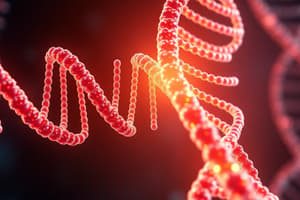Podcast
Questions and Answers
What is the fundamental unit of life according to biology?
What is the fundamental unit of life according to biology?
Which molecule serves as the genetic blueprint of life?
Which molecule serves as the genetic blueprint of life?
What is the primary function of proteins in cells?
What is the primary function of proteins in cells?
Which process involves the production of ATP, the cellular energy currency?
Which process involves the production of ATP, the cellular energy currency?
Signup and view all the answers
What are membrane-bound structures within cells that contain organelles?
What are membrane-bound structures within cells that contain organelles?
Signup and view all the answers
What are the three domains of life?
What are the three domains of life?
Signup and view all the answers
Which process describes how species change and diversify over time?
Which process describes how species change and diversify over time?
Signup and view all the answers
What is the study of interactions among organisms and their environment called?
What is the study of interactions among organisms and their environment called?
Signup and view all the answers
What is a key concept in understanding evolution according to Darwin's theory?
What is a key concept in understanding evolution according to Darwin's theory?
Signup and view all the answers
What field focuses on designing and constructing new biological systems?
What field focuses on designing and constructing new biological systems?
Signup and view all the answers
Study Notes
Exploring Science: A Journey through Biology
Biology, one of the most fascinating and wide-ranging sciences, is the study of life itself. In this article, we'll delve into the rich world of biology, exploring its key concepts and discoveries that have shaped our understanding of life.
The Basics of Biology
Biology, derived from the Greek words "bios" (life) and "logos" (study), examines life at various levels, including molecular, cellular, organismal, and ecological scales. Central to biology are the concepts of evolution, adaptation, and cellular structure.
Cells: The fundamental unit of life is the cell, which comprises membrane-bound structures containing various organelles. These organelles perform specific tasks, such as producing energy, reproducing DNA, and synthesizing proteins.
DNA: The genetic blueprint of life, DNA encodes information that dictates an organism's traits. The structure of DNA is a double helix that unzips during cell division to replicate itself and is used to synthesize proteins.
Proteins: Proteins are made up of amino acids and function as the workhorse of cells, performing tasks such as catalyzing biochemical reactions, providing cells with structure, and facilitating cell-to-cell communication.
Energy: Life processes involve energy transformations, primarily through the chemical reaction of cellular respiration, which produces ATP, the cellular energy currency.
The Tree of Life
The concept of biological classification categorizes living organisms into various taxonomic groups. The tree of life is a visual representation of interrelatedness among life forms.
Domains, Kingdoms, Phyla, Classes, Orders, Families, Genera, and Species: These are the successive levels of classification, each encompassing more specific groups of organisms. The three domains are Bacteria, Archaea, and Eukarya.
Unicellular and multicellular organisms: Life forms range from single-celled organisms, such as bacteria and protozoa, to multicellular organisms, including plants, animals, and fungi.
The Fundamentals of Evolution and Adaptation
Evolution, a cornerstone of biology, describes how species change and diversify over time. Adaptation, the process through which traits become more advantageous, is a key concept in understanding evolution.
Natural selection: This theory, proposed by Darwin, states that organisms with advantageous traits are more likely to survive and reproduce, leading to the evolution of species.
Selective pressures: These forces, such as predation, competition, and climate change, drive evolutionary change.
Adaptive Radiation: This process results in new and diverse species evolving within a short period. An excellent example of adaptive radiation is the evolution of finches on the Galapagos Islands.
Beyond the Basics: Ecology and Genetics
Biology encompasses more than the study of individual organisms. Ecology, the study of interactions among organisms and their environment, and genetics, the study of heredity, also play vital roles in understanding life.
Ecology: This field investigates the relationships among organisms and their environment, such as competition, cooperation, and predation.
Genetics: Genetics explores the transmission of traits from parent to offspring, including the functions of genes, chromosomes, and DNA.
Genetic engineering: Biotechnology has allowed humans to manipulate the genetic makeup of organisms, producing GMOs (genetically modified organisms) with specific traits.
The Future of Biology
Biology continues to evolve, with new discoveries and technologies shaping our understanding of life.
Synthetic biology: This field focuses on designing and constructing new biological systems, from simple molecules to complex living organisms.
Biotechnology: Advances in biotechnology have led to significant new applications, such as genomic sequencing, gene editing (CRISPR), and the development of novel therapeutics.
Bioinformatics: This interdisciplinary field focuses on the use of computers and algorithms to analyze and interpret biological data, facilitating the rapid progression of biology research.
Biology, with its vast array of concepts and applications, continues to expand our understanding of life, offering countless opportunities for discovery, innovation, and advancement.
Studying That Suits You
Use AI to generate personalized quizzes and flashcards to suit your learning preferences.
Description
Delve into the rich world of biology, exploring fundamental concepts such as cells, DNA, proteins, energy transformations, evolution, adaptation, ecology, genetics, and the future of biology. Learn about the tree of life, natural selection, genetic engineering, biotechnology, and bioinformatics.




